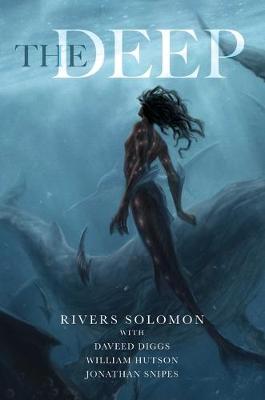Reviewed by nannah on
Content warnings:
- slavery
- trauma & generational trauma
- suicide ideation & attempt
Representation:
- every character is African
- the main character and her love interest are sapphic
- the main character is also autistic with sensory processing disorder (I’m not sure if that’s … “canon”, but as someone who’s also autistic with SPD, I’m pretty sure that’s what’s going on here)
- all the merfolk are gender fluid and intersex
- there are also two minor mlm characters shown through a flashback/the Remembering
This book came to be by a strange game of “telephone”, beginning with a song of the same name by the band, Drexciya. It was then covered by the band clipping., and then it finally became this novella by Rivers Solomon. As written in the afterward, Drexciya “created the original mythology:
“Could it be possible for humans to breathe underwater? A foetus in its mother’s womb is certainly alive in its aquatic environment. During the greatest holocaust the world has ever known, pregnant America-bound African slaves were thrown overboard by the thousands during labor for being sick and disruptive cargo. Is it possible that they could have given birth at sea to babies that never needed air? Are Drexciyans water-breathing, aquatically mutated descendants of those unfortunate victims of human greed? Have they been spared by God to teach us or terrorize us?”
Rivers Solomon expands on this mythos here, introducing the concept of a Historian (our protagonist, Yetu) who holds all the memories of past merfolk (“wajinru”) in her own body and mind, literally living her people’s trauma constantly in real time. Her other fellow wajinru are free of this burden, having short memories, save for once a year. Then, in a psychic linking event called the Remembering, the Historian shows them everything, so that they’re always somewhat connected to their past.
Holding all the wajinru’s memories and trauma, however, is killing Yetu. During one Remembering, she decides to save herself and leaves the rest of her people. She wasn’t strong enough to contain the memories, but her people surely will be. Which brings us back to Drexciya’s original line: “Have they been spared by God to teach us or terrorize us?”
I really, really wanted to love this book. There were so many significant and intense themes explored: generational trauma, community, the importance of remembering important (even if traumatic and awful) events, etc. The representation, also, is so well done and well written -- the sensory processing disorder in particular affected me deeply.
But I just couldn’t get past the writing, which just wasn’t my thing. The prose repeated itself so often that I couldn’t find it lovely (repeating several times in a single chapter that Yetu became the Historian at fourteen, that she abandoned the rest of the wajinru in the Remembering, etc. as if it was being said the first time). I don’t know if perhaps this was initially written and published in installments, which would make more sense, but it really took me out of the story and Yetu’s world.
There was also the PoV. I had to remind myself that Yetu was in her thirties -- the writing and PoV constantly made me think she was a teenager in a YA novel, which made the discussion of how the wajinru have sex especially jarring (I didn’t have a problem with the discussion itself, however).
The romance, though, was so uplifting, sincere, and lovely. I fell in love with Oori, as well as Oori and Yetu’s relationship. There were lots of things I liked about The Deep, but I just wish I was able to fall in love with it.
Reading updates
- Started reading
- 29 September, 2021: Finished reading
- 29 September, 2021: Reviewed
